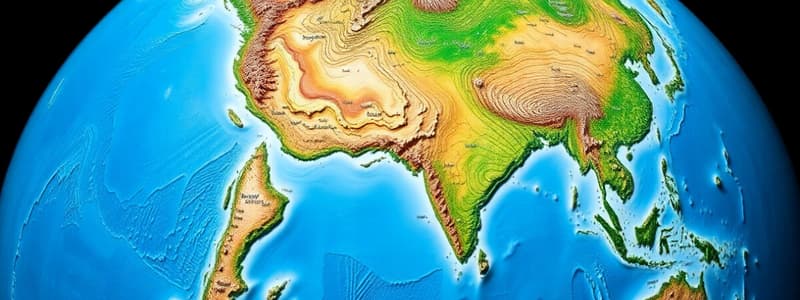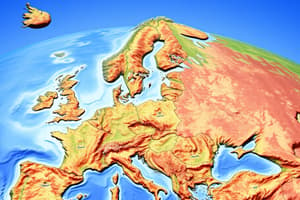Podcast
Questions and Answers
ह्यूमन जियोग्राफी में 'स्थान' का क्या अर्थ है?
ह्यूमन जियोग्राफी में 'स्थान' का क्या अर्थ है?
- जगह का प्राकृतिक स्वरूप
- भौतिक क्षेत्र की परिधि
- लोगों द्वारा एक स्थान को दिए गए अर्थ और मूल्य (correct)
- आर्थिक गतिविधियों का क्षेत्र
निम्नलिखित में से कौन सा मानव भूगोल की उप-क्षेत्र नहीं है?
निम्नलिखित में से कौन सा मानव भूगोल की उप-क्षेत्र नहीं है?
- भौतिक भूगोल (correct)
- अर्थशास्त्र भूगोल
- शहरी भूगोल
- जनसंख्या भूगोल
ग्लोबलाइजेशन से क्या तात्पर्य है?
ग्लोबलाइजेशन से क्या तात्पर्य है?
- देशों और क्षेत्रों के बीच बढ़ती अंतरनिर्भरता (correct)
- खुली सीमाओं के साथ व्यापार
- स्थानिक पहचान का नुकसान
- आर्थिक विकास का धीमा होना
किस विश्लेषण स्तर का प्रयोग करने से घटनाओं को समझने का तरीका प्रभावित होता है?
किस विश्लेषण स्तर का प्रयोग करने से घटनाओं को समझने का तरीका प्रभावित होता है?
मानव भूगोल का कौन सा क्षेत्र जनसंख्या की वितरण और घनत्व का अध्ययन करता है?
मानव भूगोल का कौन सा क्षेत्र जनसंख्या की वितरण और घनत्व का अध्ययन करता है?
क्षेत्रों को तीन मुख्य प्रकारों में से कौन सा नहीं है?
क्षेत्रों को तीन मुख्य प्रकारों में से कौन सा नहीं है?
निम्नलिखित में से क्या भौतिक भूगोल का मुख्य ध्यान नहीं है?
निम्नलिखित में से क्या भौतिक भूगोल का मुख्य ध्यान नहीं है?
इंटरैक्शन के संदर्भ में क्या महत्वपूर्ण है?
इंटरैक्शन के संदर्भ में क्या महत्वपूर्ण है?
राजनीतिक भूगोल का मुख्य उद्देश्य क्या है?
राजनीतिक भूगोल का मुख्य उद्देश्य क्या है?
कौन सा विषय मानव भूगोल में सामाजिक और आर्थिक असमानताओं का विश्लेषण करता है?
कौन सा विषय मानव भूगोल में सामाजिक और आर्थिक असमानताओं का विश्लेषण करता है?
वैश्वीकरण के प्रभावों का अध्ययन क्या बताता है?
वैश्वीकरण के प्रभावों का अध्ययन क्या बताता है?
सामाजिक भूगोल किस प्रकार के सामाजिक घटनाओं का अध्ययन करता है?
सामाजिक भूगोल किस प्रकार के सामाजिक घटनाओं का अध्ययन करता है?
किस शोध विधि का मानव भूगोल में प्रमुखता से उपयोग किया जाता है?
किस शोध विधि का मानव भूगोल में प्रमुखता से उपयोग किया जाता है?
मानव भूगोल में भौगोलिक सूचना प्रणाली (GIS) का उपयोग किस लिए किया जाता है?
मानव भूगोल में भौगोलिक सूचना प्रणाली (GIS) का उपयोग किस लिए किया जाता है?
कौन सा विषय मानव भूगोल में विविधताओं और सांस्कृतिक अभिव्यक्तियों का विश्लेषण करता है?
कौन सा विषय मानव भूगोल में विविधताओं और सांस्कृतिक अभिव्यक्तियों का विश्लेषण करता है?
नगरीकरण के सामाजिक, आर्थिक और पर्यावरणीय परिणामों का अध्ययन क्यों महत्वपूर्ण है?
नगरीकरण के सामाजिक, आर्थिक और पर्यावरणीय परिणामों का अध्ययन क्यों महत्वपूर्ण है?
Flashcards
भौतिक भूगोल
भौतिक भूगोल
यह पृथ्वी की सतह, उसकी विशेषताओं और मनुष्यों और पर्यावरण के बीच बातचीत का अध्ययन करता है।
मानव भूगोल
मानव भूगोल
यह मानवीय गतिविधियों, संस्कृतियों और आबादी के स्थानिक वितरण, पर्यावरण के साथ उनकी बातचीत और इन पैटर्न को आकार देने वाली प्रक्रियाओं की जांच करता है।
स्थान
स्थान
किसी क्षेत्र का भौतिक विस्तार, उसका भौगोलिक स्थान और अन्य स्थानों के सापेक्ष स्थिति।
स्थल
स्थल
Signup and view all the flashcards
क्षेत्र
क्षेत्र
Signup and view all the flashcards
जनसंख्या भूगोल
जनसंख्या भूगोल
Signup and view all the flashcards
आर्थिक भूगोल
आर्थिक भूगोल
Signup and view all the flashcards
शहरी भूगोल
शहरी भूगोल
Signup and view all the flashcards
राजनीतिक भूगोल की परिभाषा
राजनीतिक भूगोल की परिभाषा
Signup and view all the flashcards
सामाजिक भूगोल क्या है?
सामाजिक भूगोल क्या है?
Signup and view all the flashcards
नगरिकरण की अवधारणा
नगरिकरण की अवधारणा
Signup and view all the flashcards
वैश्वीकरण के प्रभाव
वैश्वीकरण के प्रभाव
Signup and view all the flashcards
मानव भूगोल में शोध पद्धतियाँ
मानव भूगोल में शोध पद्धतियाँ
Signup and view all the flashcards
पर्यावरणीय मुद्दे
पर्यावरणीय मुद्दे
Signup and view all the flashcards
सामाजिक और आर्थिक असमानता
सामाजिक और आर्थिक असमानता
Signup and view all the flashcards
प्रवासन का अध्ययन
प्रवासन का अध्ययन
Signup and view all the flashcards
Study Notes
Branches of Geography
- Geography is a broad discipline that studies the Earth's surface, its features, and the interactions between humans and the environment.
- It encompasses two main branches: physical geography and human geography.
- Physical geography focuses on natural phenomena like landforms, climate, ecosystems, and natural resources.
- Human geography examines the spatial distribution of human activities, cultures, and populations, their interactions with the environment, and the processes that shape these patterns.
- The interplay between physical and human geography is crucial in understanding the complex relationship between humans and their environment.
Key Concepts in Human Geography
- Space: Refers to the physical extent of an area, its geographical location, and position relative to other places.
- Place: Represents the specific meanings, values, and character attributed to a location by people. The uniqueness of a place stems from subjective experience and cultural associations.
- Region: An area distinguished by specific characteristics, either physical or human. Regions can be formal (e.g., defined by political boundaries), functional (e.g., based on economic activity), or vernacular (e.g., perceived by inhabitants).
- Scale: The level of detail considered during the analysis; different scales (local, regional, national, global) affect the way phenomena are understood and addressed.
- Interaction: The reciprocal relationship between people and places, and how these interactions are shaped by distance, accessibility, and connectivity.
- Diffusion: The spread of phenomena across space and time, considering the different mechanisms and rates involved.
- Globalization: The increasing interconnectedness and interdependence of countries and regions worldwide, driven by factors like trade, technology, and communication.
Subfields within Human Geography
- Population Geography: Studies population distribution, density, growth, and migration, examining factors impacting these patterns (e.g., economic opportunities, political stability).
- Economic Geography: Explores the spatial patterns of economic activity, including industries, trade, production, and consumption. It examines the interplay between economic systems and geographic location.
- Urban Geography: Investigates cities, their structure, growth, development, functions, and interactions with their surrounding environments.
- Political Geography: Examines the spatial aspects of political processes and organizations, including borders, territories, political parties, and electoral systems. It examines the influence of geography on political power and decision-making.
- Cultural Geography: Studies the spatial distribution of cultural traits and phenomena, including language, religion, ethnicity, and traditions, emphasizing the diversity and change in cultural expressions across places.
- Social Geography: Explores the spatial aspects of social phenomena, including inequality, social movements, and daily life.
Key Themes and Issues in Human Geography
- Urbanization: The increasing concentration of people in urban areas, examining the social, economic, and environmental implications of this trend.
- Globalization and its impacts: Examines the benefits, inequalities, and environmental consequences of increased interconnectedness. Studies the interplay between globalization and local contexts.
- Environmental issues: Analyzes the relationship between human activities and environmental problems, such as climate change, pollution, and resource depletion.
- Social and economic inequality: Examines the spatial variations in access to resources and opportunities, looking at factors like poverty, discrimination, and disparities in health outcomes across different locations.
- Migration: Exploring the motivations, challenges, and consequences of human movement, focusing on both individual and societal impacts.
Methodology in Human Geography
- Human geographers utilize a variety of research methods, including fieldwork, surveys, statistical analysis, and mapping to study and understand patterns and spatial processes.
- Qualitative research methods like interviews and participant observation are often used to uncover the meanings and experiences associated with particular places and spaces.
- Geographic Information Systems (GIS) are frequently employed to analyze spatial data and create maps to visualize patterns and relationships.
Interdisciplinarity of Human Geography
- Human geography draws on concepts and methods from other disciplines, including sociology, economics, political science, and anthropology, to create an understanding of the multifaceted relationships between people and places.
- It often adopts a holistic approach integrating social, economic, and ecological contexts to study human interaction with the environment.
Studying That Suits You
Use AI to generate personalized quizzes and flashcards to suit your learning preferences.




